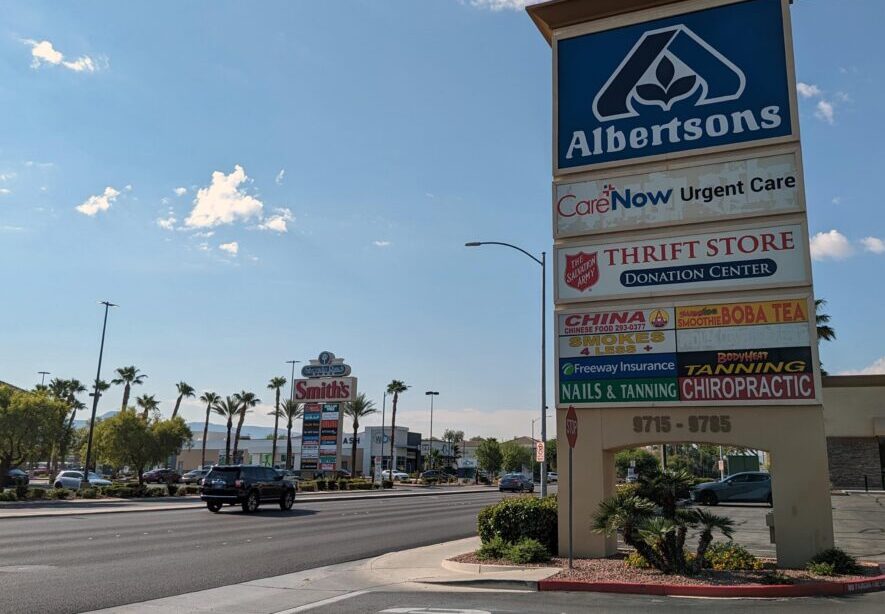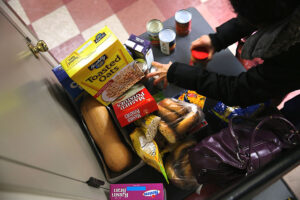12:39
News Story
FTC, Nevada file lawsuit to block merger between grocery giants Kroger, Albertsons
Attorney General Aaron Ford on Monday announced that Nevada has signed onto a Federal Trade Commission lawsuit to block the proposed merger of Kroger and Albertsons, arguing the $24.6 billion deal is anticompetitive.
“Nevadans made their concerns known regarding this merger, and we listened,” said Ford in a statement, referring to a series of public listening sessions his office held last year. “This merger would create an anticompetitive marketplace, raise prices on everyday Nevadans and harm grocery store employees.”
In addition to comments made at the in-person listening sessions, thousands of statements were submitted online through a survey, according to the attorney general’s office. Several elected officials, including Democratic Sen. Jacky Rosen, have spoken in opposition to the deal.
Ford is a part of a bipartisan group of nine attorneys general who signed onto the FTC’s efforts to block the merger. The other states represented are Arizona, California, the District of Columbia, Illinois, Maryland, New Mexico, Oregon, and Wyoming.
“This supermarket mega merger comes as American consumers have seen the cost of groceries rise steadily over the past few years,” said Henry Liu, director of the FTC’s bureau of competition, in a statement. “Kroger’s acquisition of Albertsons would lead to additional grocery price hikes for everyday goods, further exacerbating the financial strain consumers across the country face today. Essential grocery store workers would also suffer under this deal, facing the threat of their wages dwindling, benefits diminishing, and their working conditions deteriorating.”
The Kroger Co. in a statement released in response to the lawsuit said the company has “reduced prices every year since 2003, resulting in $5 billion invested to lower prices and a 5% reduction in gross margin over this period” and argued the merger with Albertsons “will mean even lower prices and more choices for American consumers.”
Consumer groups praised the action from the FTC.
“After 40 years of allowing corporations to accumulate unchecked power to raise prices, rip off workers, and crush small businesses, it is clear that the Commission understands the harms that consolidation inflicts on Americans and is committed to restoring open, competitive markets,” read a statement from Stacy Mitchell, co-executive director at the Institute for Local Self-Reliance, which opposes the merger. “Today’s action from the FTC signals a return to the heart of antitrust.”
If the proposal goes through, Kroger and Albertsons would operate more than 5,000 stores and approximately 4,000 retail pharmacies and would employ nearly 700,000 employees across 48 states, according to the FTC.
Kroger in its statement said any attempt to block the merger “only strengthens larger, non-unionized retailers like Walmart, Costco and Amazon by allowing them to further increase their overwhelming and growing dominance of the grocery industry.”
Albertsons released a similar statement, saying the merger “will ensure our neighborhood supermarkets can better compete with these mega retailers, all while benefitting our customers, associates, and communities.”
In the statement, Albertsons said the company is disappointed in the FTC and looking forward to presenting their arguments in court.
In Nevada, Kroger operates as Smith’s Food and Drug while Albertsons operates under its namesake brand and as Vons and Safeway. Together, the dedicated grocery stores made up 28% of the grocery share in Nevada in 2022, according to industry data compiled by the investment bank and financial services company Solomon Partners. Walmart and Sam’s Club made up 31%.
One decade earlier, in 2012, Kroger and Albertsons made up 35% of grocery share in Nevada, compared to Walmart’s 26%.
Solomon Partners found that non-union national discount grocers like Walmart, Costco and Amazon grew their share of Nevada’s market by 11.3% between 2012 and 2022, while Kroger and Albertsons saw their share decrease by 6.2%.
But the United Food and Commercial Workers International Union (UFCW), which represents 1.3 million workers across the U.S. and Canada, has come out in strong opposition to the merger.
Editor’s Note: This article has been updated to include a statement from Albertsons.
Our stories may be republished online or in print under Creative Commons license CC BY-NC-ND 4.0. We ask that you edit only for style or to shorten, provide proper attribution and link to our website. AP and Getty images may not be republished. Please see our republishing guidelines for use of any other photos and graphics.




